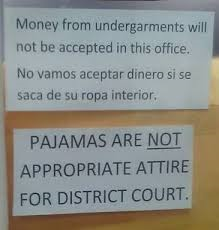Friday Roundup
Latest sign of the coming apocalypse. I've often said that one of the worst things that can happen to you is to be charged with a crime, especially a felony, but I have to confess that the sentiment is not shared by a number of my clients. Oftentimes, a new client will express confusion or uncertainty in response to my question about whether they have a criminal record. Me, I figure standing in a courtroom in front of someone in a robe who can send me to prison would be a formative event in my life. I would also think that my appearance before someone in a robe who could send me to prison would be cause for punctuality on my part. Not so much; I once had a 9:00 pretrial, and finally called my client at 11:45 to inquire as to his whereabouts, only to be told that he'd just woken up.
People don't dress up for church anymore, so it's not surprising that most  clients don't feel sartorial splendor is called for in court, either. While the standards there haven't plummeted as far as those of one client of mine, who showed up for trial in a domestic violence case wearing a wife-beater, saggy pants and t-shirts seem to have become de rigueur attire, prompting one judge to draw the line by banning pajamas. Even more distressing than the sign about the pajamas is the advisement on top of it, stating that "money from undergarments" will not be accepted. Eeeewwww.
clients don't feel sartorial splendor is called for in court, either. While the standards there haven't plummeted as far as those of one client of mine, who showed up for trial in a domestic violence case wearing a wife-beater, saggy pants and t-shirts seem to have become de rigueur attire, prompting one judge to draw the line by banning pajamas. Even more distressing than the sign about the pajamas is the advisement on top of it, stating that "money from undergarments" will not be accepted. Eeeewwww.
You're not yourself without a Snickers. Nor without a Kit-Kat bar, at least to Saima Ahmad, a 20-year-old London law student. She recently purchased a multi-pack, only to find that it was all chocolate, missing the wafer. If this were America, she probably would have sued.
Wait! They do that in England, too! Ms. Ahmad promptly wrote Nestle, claiming that the lack of a wafer caused her a loss of "monetary and emotional significance," and threatening to take further action unless they provided her a lifetime supply of Kit-Kats as compensation. Showing a level of greed all too familiar to personal injury lawyers on this side of the pond, Ms. Ahmad admitted she was "trying her luck," adding "if you don't ask you don't get.
Should've checked one more thing. If I walk into a courtroom where the lawyers are preparing for trial, I can always tell if it's a civil case or a criminal case. The civil case will have three lawyers sitting at each table, multiple accordion files arrayed in front of them, and box after box of papers and exhibits stacked behind them. If it's a criminal case, there'll be a lawyer at a table with a file folder maybe half an inch thick. I still try an occasional civil case from time to time, and it's always a marvel: "You mean I get to find out what everybody's going to say beforehand?" Even with the new open discovery rules in criminal cases, there's no comparison in what information you can acquire in preparation for a civil trial.
Robert Hilliard wishes he'd found out one more piece of information. He was representing a number of plaintiffs in the case against GM for faulty ignition switches, and that he had found the ideal plaintiff for the first trial in Federal court: Robert Scheuer, a postman from Tulsa. He and his wife testified that as a result of the injuries he sustained in a 2014 wreck of their Saturn Ion had caused them to lose income which resulted in eviction from their "dream house."
The realtor who'd sold them that house heard about it on the news, and immediately called up GM. He'd been the one to have the Scheuer's evicted. He'd let them into the new house before they'd paid for it, on the strength of a deposit stub showing that they'd deposited $441,430.72 in the bank, only to learn that Scheuer had added "441" in front of the $430.72 that he'd actually deposited. With the new revelation, GM accused the Scheuers of perjury, and they dropped their case halfway through trial, without getting a penny.
Well, maybe they'll get a malfunctional Kit-Kat bar the next time.
Comments